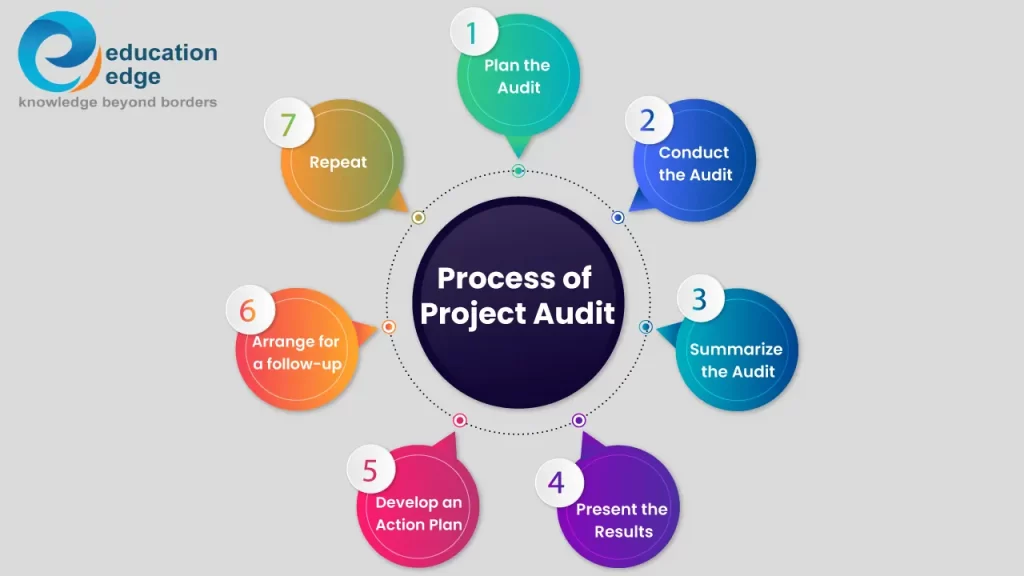If there is one word that can make any working professional uneasy, it is “audit.” So, take a look toward project audit. READ ON!

What is a project audit? Do you want to know that? A project audit is a systematic examination of a project’s performance, progress, and outcome in relation to pre-defined objectives, goals, and criteria. It is critical for a project manager because labor, time, and money are all on the line. As a result, internal audit teams involved in project management can benefit from auditing to guarantee that all projects within a company are on track.
Make sure to check: WIP Full Form: Understanding the Meaning and Importance!
What is Project Audit?
It is an official review of a project that is typically used to determine how well project management standards are being followed. Audits are typically performed by a specially designated audit department, the PMO, an approved management committee, or an external auditor.
Whoever is in charge of executing the audit must be in charge of the authorized authority and offer corresponding recommendations.
A project audit’s ultimate goal is to guarantee that the project meets project management standards through investigation and review.
Project Audit Types in Project Management
There are following types of project audit mentioned below:

1. Normal Audit:
This is known as an audit, and it is part of the Monitoring and Controlling method team. It is often known as inspection because it is essentially a quality control procedure. After the item is constructed, the assessment is done.
2. Quality Audit:
This is part of the execution procedure and involves a critical review of the project. Hence, they investigate if the team adheres to the company’s process.
3. Procurement Audit:
The procurement Audit is a member of the Closing procedure team. An organized general comment, as part of procurement closure, flushes out worries, establishes mastered instructions, guarantees difficulties are resolved for future jobs, and recognizes favorable outcomes as well as problems that support transfer to various other procurements.
4. Risk Audit:
These audits are conducted by both the Monitoring and Controlling teams. These contribute to the overall progression of the treatment. You can also audit and evaluate the overall usefulness of the risk management approach.
Benefits of Project Audit
A project management audit is a systematic review of a project’s management methods and performance. Here are some example of project management audit such as:
1. Enhance Project Outcome:
A project management audit can assist enhance project outcomes by identifying best practices and areas for improvement.
As an Example: An audit may uncover that a team is not communicating effectively with stakeholders, resulting in misconceptions and delays. The audit may recommend that regular status updates and stakeholder participation be implemented to improve communication and, ultimately, project outcomes.
2. Detect Potential Issues Early:
Potential difficulties can be recognized early in the project lifecycle through a project management audit, allowing for prompt corrective action.
As an Example: It may uncover that a project team is behind schedule and has miscalculated the amount of time needed to accomplish crucial activities. This information can be utilized to improve the project strategy and resource allocation.
3. Ensure Regulation and Standard Compliance:
A project management audit can assist in ensuring that the project is in accordance with all applicable norms and standards.
As an Example: It may discover that a project is not in compliance with environmental or safety requirements. To ensure compliance with regulations and standards, the audit may recommend installing certain procedures or controls.
4. Increase Stakeholder Trust:
Stakeholders can develop trust in the project’s management processes and outcomes by completing a project management audit.
As an Example: It may demonstrate that the project team has strong project management practices in place and is managing risks effectively, increasing stakeholder confidence in the project’s success.
5. Improve Project Management Processes:
A project management audit can help improve project management procedures by identifying areas for improvement.
As an Example: It may demonstrate that the team is not adequately managing risks. The audit may suggest creating a formal risk management strategy to more effectively detect, assess, and reduce risks.
Project Audit Process

1. Plan the Audit:
You should never start something without a plan. Inform everyone involved in the audit and the project about the approaching audit and highlight that there is nothing to be concerned about. It is a method of improving rather than blaming.
2. Conduct the Audit:
Conduct the audit and follow a strict method to acquire all data and proof. Conducting in-person, group, or questionnaire interviews with the project sponsor, manager, and team is part of this process.
3. Summarize the Audit:
You’ll have a lot of data at this point, so summarize your findings regarding any improvements and defects in an executive summary to present a clear and broad perspective. Make a point of acknowledging and appreciating those who have performed admirably.
4. Present the Results:
Then, from your team to your stakeholders, you’ll want to provide the audit summary to everyone who needs to know about it. At this point, search for possibilities that have been realized and implemented, as well as a list of all problems that have been resolved and have not been resolved.
5. Develop an Action Plan:
With all of this information, you can now design an action plan to help you increase efficiency. Get others involved and map out a plan with duties and deadlines. So, define the solution utilizing all of the data acquired through interviews, meetings, or questionnaires. This will be passed on to upper management.
6. Arrange for a follow-up:
Keep up with this action plan. Check it again to make sure the plan is working as intended.
7. Repeat:
Because you should never get comfortable, this is a comprehensive list that should be made in a circle. Therefore, you will obtain better efficiencies the more audits you conduct.
You may also check: What is Risk Mitigation? Know This Before It’s Too Late!
Frequently Asked Questions
By examining whether or not the project management is entirely compliant with the organization’s policies, procedures, and processes, It can evaluate whether it meets the requirements.
An audit is crucial because it lends credibility to a set of financial statements and offers shareholders trust that the figures are accurate and fair.





